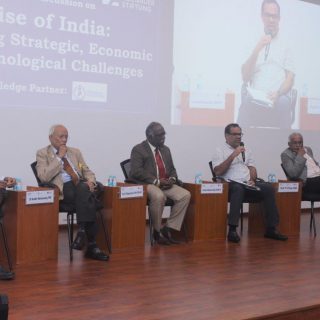Panel Discussion on “Rise of India: Managing Strategic, Economic, and Technological Challenges”

The Peninsula Foundation (TPF), in partnership with Madras Management Association (MMA), organized the first event under ‘Strategic Management and Leadership Series’ on January 29, 2020. The discussion was on the theme ‘Rise of India: Managing Strategic, Economic and Technological Challenges’. The panel consisted of Professor TV Paul, Lt Gen V R Raghavan, Dr. Sunder Ramaswamy and Vice Admiral B Kannan, and was chaired by Air Marshal M Matheswaran, Chairman of TPF.
Prof TV Paul, James McGill Professor of International Relations at McGill University at Montreal, gave an overview of his ongoing research on the theme. He analysed India’s aspiration for global power status and explained the shortfalls in its trajectory to achieve this objective. He said in modern history, great power competition has been Euro-centric. Primarily post-war settlements determined the power status of a country. India missed her chances twice to assert power in global space and currently dominates power in South Asia. The professor enumerated few parameters to explain the importance of power. Psychological value, material benefit, moral right and civilizational bases are the important reasons for a country like India to pursue a power status. There has been two great opportunities for India in the process; freeing itself from dependency on erstwhile USSR as a result of end of the Cold War and the exposure to globalization. In analysing the challenges to India’s rise in 21st century, Paul stressed on important weaknesses: poor state capacity, lack of inclusive development and growing internal divisions. In his opinion a Great power has to use combination of both soft power and hard power in balance to achieve the desired status in the international system.
Lt Gen V R Raghavan, a well-known strategist and a former DGMO, discussed the positive developments that happened in India over the past few years. He raised an important question about whether it would be right to view India’s performance as an emerging power through the Euro-centric lens of a rising power. He emphasised that India currently requires strategic stability in both military and economic domains. World view of Indian leaders are undergoing changes and maintaining an internal cohesion is prerequisite for gaining national power. While India has tackled many of its challenges in the most creditable manner, he cautioned against the rise of the new trend in the current environment. This was about the danger of militarising the foreign policy. He said if India goes down the path of a militarised foreign policy it would be disastrous.
Dr. Sunder Ramaswamy, vice chancellor of KREA University emphasized the huge differences in India’s development across its geographical regions. Holding an optimistic view on India’s growth momentum the economist underscored the importance of investing in human resources and capital resources. Micro-economic dynamism has to be connected with macro- economic framework to prepare an economic blueprint for India. Looking at the economic lens, Dr Sunder Ramaswamy mentioned India requires major banking reforms urgently. He emphasised India, with more than one-sixth of the world’s population, just cannot afford to fail. He made an important observation with an analogy from his work as an educator and administrator, wherein India’s current performance was like the student who had the potential to perform at A+ level but does not match his potential and gets just a B or B- grade.
Vice Admiral Kannan, CEO L&T commenced his speech by highlighting the importance and potential of disruptive technologies. If India is to leapfrog its development, it would need to focus significantly on developing its human resources and a culture of innovation. There is a huge deficiency in our required skills and he emphasised the skill mismatch as a challenge to exploit positively India’s demographic dividend. While innovation is taking place in the service sector, technology development for defence has been well short of expectations and there is a need for third party or private sector to take the lead and drive innovation.
The panel elicited considerable interest and questions on the future of India’s growth, given the current economic downturn and ongoing political slugfest. The most important analysis was that India will need to adopt a far more consistent and coherent national strategy over the long-term to ensure its aspirations are within its grasp. A most astute political process, political leadership, accountability and transparency are necessary for India to realise its position in the international system of the 21st century.
